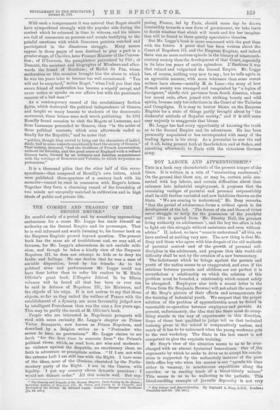THE COMEDY AND TRAGEDY OF THE SECOND EMPIRE.*
By careful study of a period and by something approaching enthusiasm for a cause Mr. Legge has made himself an authority on the Second Empire and its personages. That be is well informed and worth listening to, his former book on the Empress Eugenie proved beyond question. The present book has the same air of truthfulness and, we may add, of fairness, for Mr. Legge's a.dmirations do not exclude criti- cism, and though he takes a kindly view of the Emperor Napoleon III. he does not attempt to hide or to deny his faults and failings. No one doubts that he was a man of amiable disposition, loved by his friends. As to his political aims and performances Mr. Legge could not have done better than to refer his readers to M. Emile 011ivier's great book, L 'Empire Liberal. In its fifteen volumes will be found all that has been or over can be said in defence of Napoleon III., his Ministers, and the objects of his reign. It is not untrue to say that those objects, so far as they united the welfare of France with the establishment of a dynasty, are more favourably judged now 'by intelligent Frenchmen than was the ease a few years ago. This may be partly the result of M. 011ivier's book.
People who are interested in Napoleonic prospects will read with some curiosity Mr. Legge's chapter on Prince Victor Bonaparte, now known as Prince Napoleon, and described by a Belgian writer as a "Pretender who seems to have no pretensions." Mr. Legge claims to set forth "for the first time in concrete form" the Prince's political views, which, as read here, are wise and moderate : no violence against the Republic, no reactionary ideas, no faith in adventure or preeipitate action. "If I am not with the extreme Left I am still less with the Right. I have none of the ideas, none of the illusions, cherished by the Parlia- mentary party of the Right. I am in the Centre, with legality. I put my country above dynastic questions : would not disturb order." All this sounds well. But sup- * Ths Comedy and Tragedy of the Second Empire: Parts Society in the Sixties ; including Lettern of Napoleon M., M. Mitri, and COnli0 de la Chapelle, and Portraits of the Period. lly Edward Legge. London : Harper and Brothers. Us. 6d. Leta posing France, led by Paris, should some day be drawn irresistibly towards a new form of government, we take leave to doubt whether that which will touch and fire her imagina- tion will be found in these quietly speculative theories. But Mr. Legge's book is more concerned with the past than with the future. A great deal has been written about the Court of Napoleon III. and the Empress Eugenie, and indeed there was no more curious episode in the history of nineteenth- century society than the development of that Court, especially in its later ten years of exotic splendour. L'Exatisme it was that ruined and vulgarized the Second Empire. Mr. Legge has, of course, nothing very new to say ; but be tells again in an agreeable manner, with more tolerance than some recent writers have shown—notably M. de Limo—the story of how French society was swamped and vanquished by "a legion of foreigners," chiefly rich parvenus from South America, whose low moral code, often joined with striking beauty and wild spirits, became only too infectious in the Court of the Tuileries and CompiAgne. It is easy to bestow blame on the Empress Eugenie for a state of things partly brought about by "the disdainful attitude of Royalist society," and it is still more easy unjustly to exaggerate that blame.
Mr. Legge has bad every opportunity of knowing the truth as to the Second Empire and its adventures. He has been personally acquainted or has corresponded with many of the leading figures in his story. As a journalist be saw the end of it all, being present both at Saarbriieken and at Sedan, and marching afterwards to Paris with the victorious German






















































 Previous page
Previous page